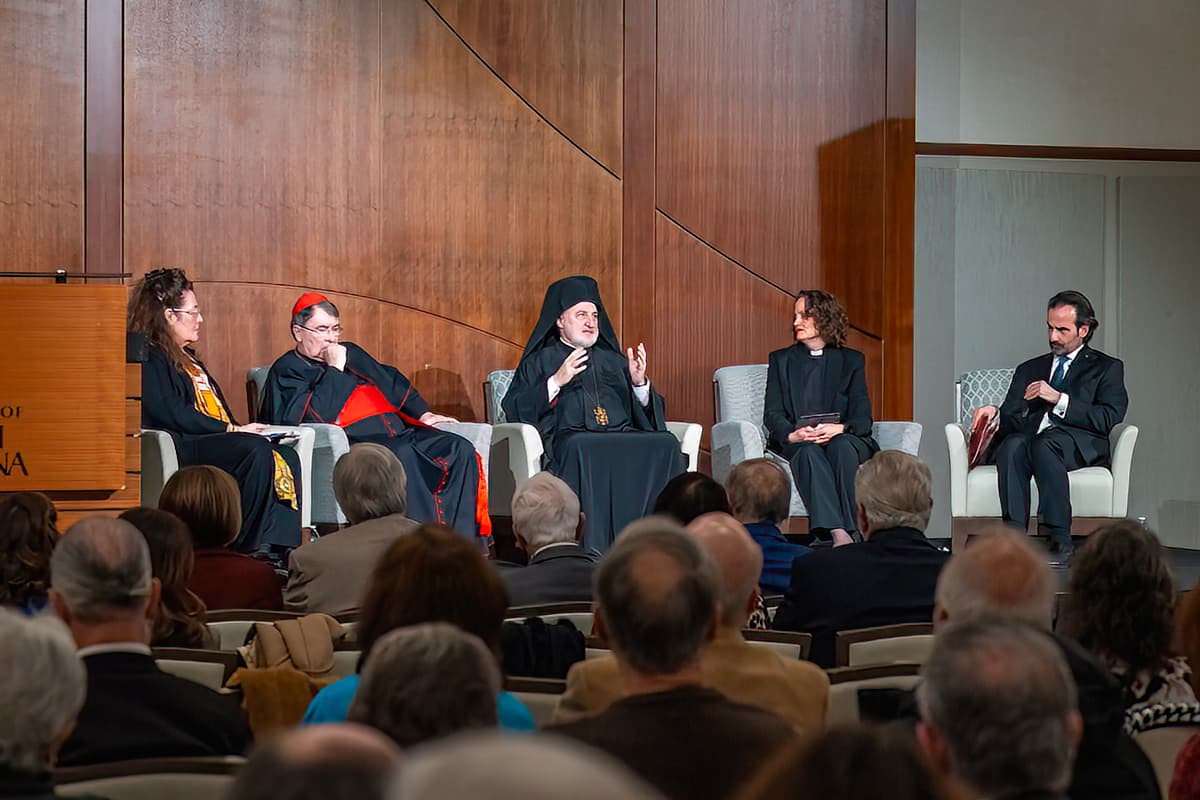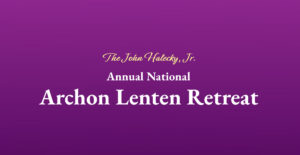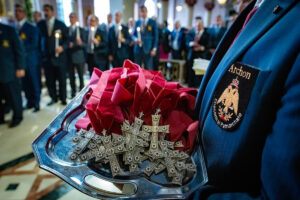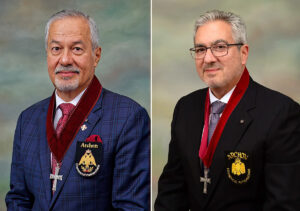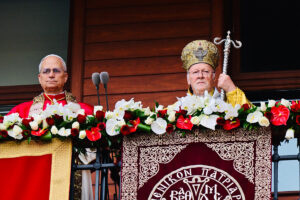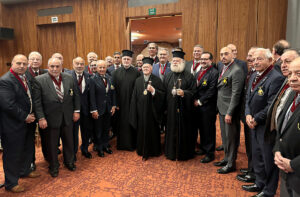His Eminence Archbishop Elpidophoros of America, Exarch of the Ecumenical Patriarchate, addressed a Religious Freedom Symposium, “God Created Us to Live In Harmony (Romans 12:16).” This symposium, presented by the Archons of the Ecumenical Patriarchate, was held on Saturday, March 22, 2025 at the University of South Carolina in Columbia.
Other featured speakers included His Eminence Cardinal Christophe Pierre, Apostolic Nuncio to the United States from the Holy See of Rome; the Reverend Dr. Mae Elise Cannon, Executive Director of Churches for Middle East Peace, Ordained Pastor in the Evangelical Covenant Church; and Dr. Anthony J. Limberakis, National Commander of the Archons of the Ecumenical Patriarchate (AEP).
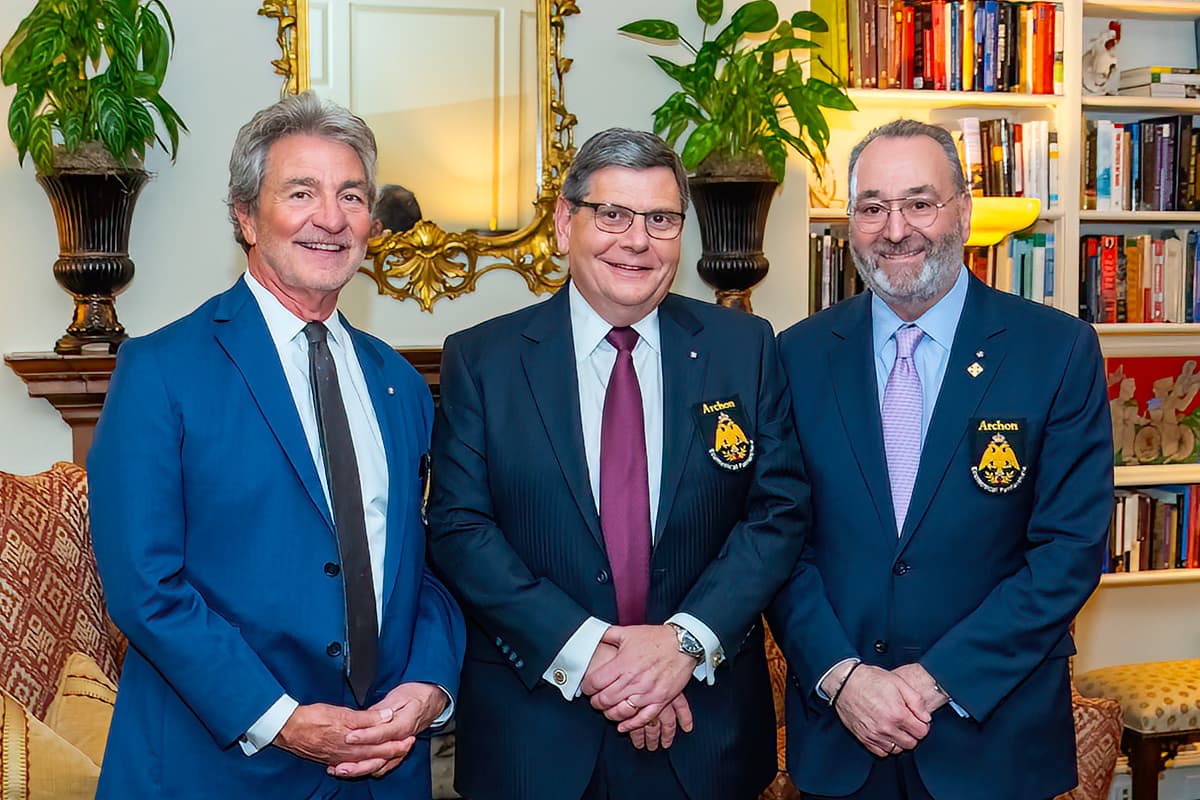
The organizers of the symposium were Archons Steve Trakas, Dr. Terry Sarantou and Drew Theodore; the moderators were Archon Professor Aristotle “Telly” Papanikolaou, Professor of Theology and Archbishop Demetrios Chair in Orthodox Theology and Culture and Co-founding Director of the Orthodox Christian Studies Center at Fordham University; and Professor Elizabeth Prodromou, Professor of the International Studies Program at Boston College and a Non-Resident Senior Fellow of the Atlantic Council’s Eurasia Center. Archons throughout the east coast were in attendance, demonstrating their support for religious freedom for the Holy Mother Church.
The symposium’s mission was to look through the lens of the Eastern Orthodox, Roman Catholic and Protestant faith teachings to better understand how our loving God has protected His flock and the issues facing Christians today.
On Friday, March 21, His Eminence Archbishop Elpidophoros of America was welcomed by Dr. Limberakis and Archons Sarantou, Trakas and Theodore to Columbia. The Archons also welcomed His Eminence Cardinal Pierre and Reverend Dr. Cannon. See photos here.
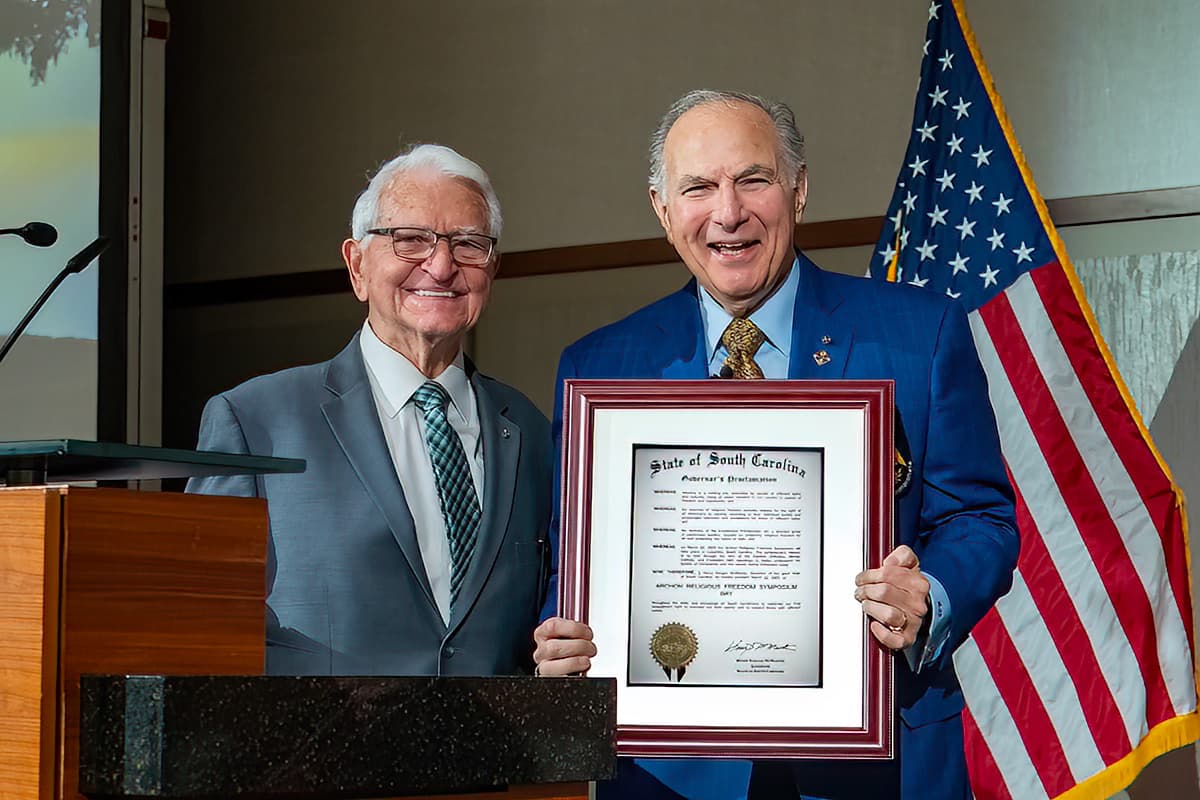
On the same day, a Salutations Service was held at Holy Trinity Church in Columbia, SC. At the conclusion of the service, His Eminence Archbishop Elpidophoros of America invested Dr. Michael D. Amiridis, President of the University of South Carolina, as an Archon. See photos here.
That evening, the newly invested Archon Dr. Amiridis, along with university First Lady Ero Aggelopoulou-Amiridis, hosted an elegant welcoming reception and dinner at the official presidential residence on campus for panelists, moderators and Archons who were visiting for the conference. See photos here.
At the symposium itself, Dr. Limberakis welcomed the gathering in the Opening Session and presented the origins of the ancient title Archon. He also detailed the significant Archon initiatives in educating the oikoumene regarding the deficit of religious freedom in Turkey and the Archons’ efforts to ameliorate that deficit. See photos here.
In his remarks, His Eminence Archbishop Elpidophoros emphasized that “freedom of conscience – an interior state – must be accompanied by the freedom to exercise that conscience, or it is no freedom at all. This says a great deal about how we treat minority belief systems within all societies, and whether they can be seen as having equal value with those of the majority.”
His Eminence explained that differing faith traditions were akin to different lenses through which we see the world: “We may well have different lenses, ground over time and circumstances to varying strengths and magnifications, sharpness and contrast, but we are all united by the fundamental truth of the Gospel. Even within our own faith communities, there can be tremendous divergence of emphases and priorities. This is one of the main reasons that we often resonate with those outside our circles, rather than those within them.”

Stressing that “we are all called to face the issues of our world with the same compassion and mercy that we would offer to members of our own family,” His Eminence quoted His All-Holiness Ecumenical Patriarch Bartholomew saying that “existential problems of contemporary humanity cannot be a matter of indifference to the Orthodox Church, which is called upon to articulate an evangelical response to these problems.”
His Eminence Cardinal Pierre outlined the varying responses of the Roman Catholic Church to the question of religious freedom over the centuries. He noted the groundbreaking efforts of Father John Courtney Murray, a twentieth-century American Jesuit, in “the rediscovery of biblical principles of religious freedom, rooted in the dignity of the human person,” which, said Cardinal Pierre, “started in the United States of America.”
Father Murray, stated Cardinal Pierre, “dedicated his life’s work to reconciling Catholicism and participation of Catholics in public and political life with religious pluralism and freedom. He reasoned that religious freedom is not a concession granted by the state but a fundamental right stemming from human dignity. He argued that members of the Catholic Church should not seek to impose their beliefs and moral values on others but should instead actively engage in public debate. By doing so, they would deepen their religious commitments and safeguard American freedoms. In other words, they would be both good citizens respecting freedom of others, and good Catholics obeying God’s commandments and the teachings of the Church.”
Cardinal Pierre outlined how this became the position of the Roman Catholic Church at the Second Vatican Council and is a cornerstone of the ministry of Pope Francis. Cardinal Pierre explained that “from the Catholic point of view, freedom of religion is a fundamental human right rooted in the dignity of the human person. The Catholic Church teaches that every individual has the right to seek the truth about God, adhere to that truth once it is found, and practice their faith freely, without coercion or unjust interference, as long as the rights of others and the common good are respected.”
Dr. Cannon spoke of how welcomed she had been made to feel and said “hospitality is a part of what Christian unity is all about.” She added that “kindness, hospitality, generosity, and graciousness” were the fruits of the Spirit as noted in Saint Paul’s Letter to the Galatians. Dr. Cannon detailed how the Christians of the Middle East exemplified the unity that all Christians are called to manifest, even coming to informal agreement on the date of Easter so that they could all worship together.
Dr. Cannon said that “in many Christian circles, there has been an over-spiritualization of unity,” and thanked His Eminence for speaking about the need to wrestle with that which divides us. She quoted Dr. M. Scott Peck, author of The Road Less Traveled, saying that “conflict is a necessity in the formation of real community.”
At times, Dr. Cannon added, consensus is reached quickly, but at other times is only the fruit of “lengthy struggle. Just because it’s a safe place does not mean that a community is a place without conflict. It is, however, a place where conflict can be resolved without physical or emotional bloodshed, and with wisdom as well as grace.”
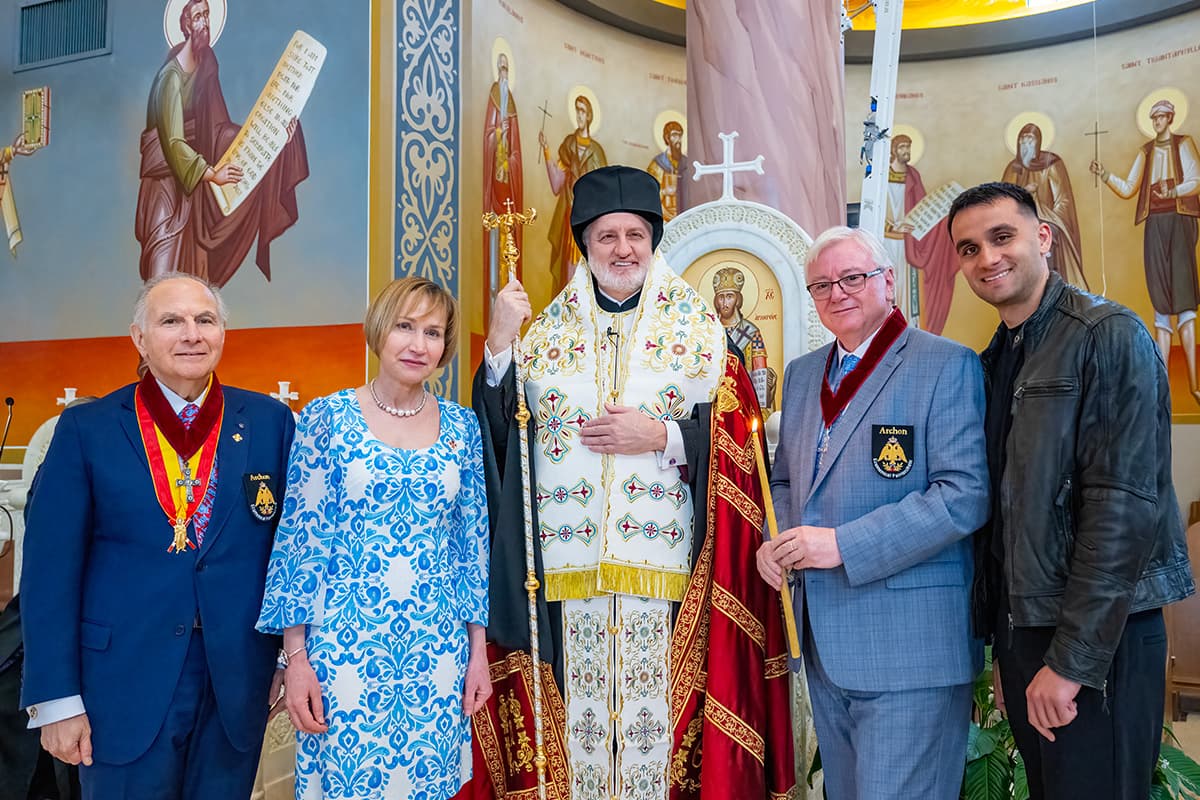
Another highlight of the symposium was the opening remarks of Archon Hon. Nick Theodore, the 85th Lieutenant Governor of South Carolina from 1987 to 1995, who recounted the visit to South Carolina of His Holiness Pope John Paul II, His Eminence Archbishop Iakovos of North and South America, Archbishop of Canterbury Robert Runcie, and the Reverend Doctor Billy Graham, in 1987, which was truly an extraordinary year of ecumenism for the University of South Carolina.
At the conclusion of his remarks, Archon Hon. Theodore presented an official Proclamation issued by Henry Dargan McMaster, the Governor of South Carolina proclaiming March 22, 2025 as Archon Religious Freedom Symposium Day.
Dr. Limberakis stated: “Profound gratitude is expressed to an exceptional Archon team of leaders, organizers and volunteers. AXIOI!”
The Archons of the Ecumenical Patriarchate (AEP) is a devoted group of passionate leaders, relentlessly focused on protecting religious freedom for everyone and ensuring the future of the Ecumenical Patriarchate – the historical spiritual center of the world’s 300+ million Orthodox Christians.
